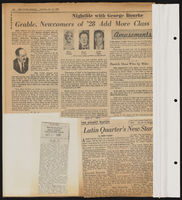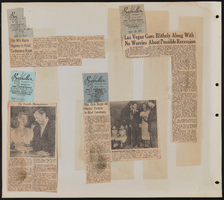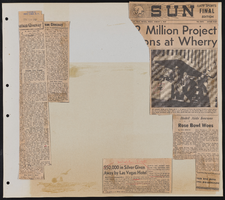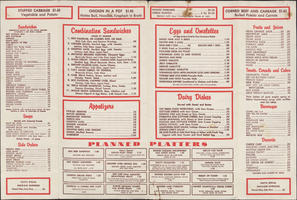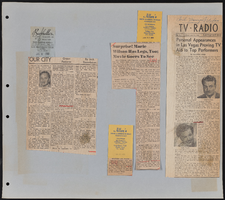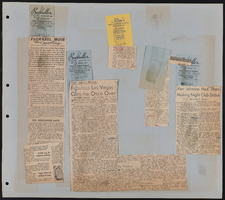Search the Special Collections and Archives Portal
Search Results
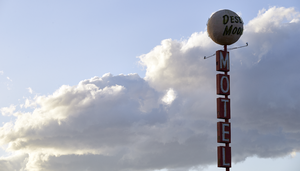
Photographs of Desert Moon Motel sign, Las Vegas (Nev.), April 18, 2017
Date
Archival Collection
Description
Site name: Desert Moon Motel (Las Vegas, Nev.)
Site address: 1701 Fremont St
Sign owner: Jerzy and Celina Kosla
Sign details: The building was constructed in 1942 (Assessor). According to one commentator, the Desert Moon motel opened on the site in 1952 (Roadside Architecture.com). The cars on a vintage postcard of the motel appear to date from the late 1940's or early 1950's (Ebay). The same vintage postcard (Ebay) shows the motel as a member of United Motor Courts, an early motel referral chain founded in 1933 which published a travel guide until the early 1950's (Wikipedia). Based in Santa Barbara, California, United Motor Courts was made up of "a friendly group of independent owners of motor lodges..." (Historic Highways). The Quality Inn motel franchise was a spinoff of United Motor Courts (Wikipedia). The motel has been renovated by its current owner, Polish immigrant George (Jerzy) Kosla (Glionna, 2017).
Sign condition: The sign is Condition 4, good. The paint appears slightly faded but there is no flaking or peeling. The cabinets, reader boards, and fiberglass moon are all in good condition. The neon is intact.
Sign form: Pole sign
Sign-specific description: The sign pole and metal cabinets are painted pink. The design and lettering are the same on both sides of the sign. The trapezoid-shaped lower cabinet extends horizontally toward the street. It contains a rectangular white plastic lightbox which states "FREE ADULT MOVIES" in red sans serif letters and "FLAT SCREEN TV'S in smaller black san serif letters. To the left of the letters is the black silhouette of a female figure. On the metal below the plastic screen are clear sans serif neon letters which spell out, "NO VACANCY" in red when illuminated. The upper metal cabinet hangs from the street side of the pole. White painted san serif letters, covered by clear sans serif neon letters which glow red when illuminated, run vertically down the cabinet to spell out, "XXX MOVIES". Five metal cabinets attached to the street side of the sign run vertically to spell out, "M-O- T-E- L" in white painted sans serif letters covered by yellow sans serif neon letters. On top of the pole is a white p
Sign - type of display: Neon, Lightbox
Sign - media: Steel, Plastic, Fiberglass
Sign - non-neon treatments: Lightbox
Sign environment: East Fremont Street, surrounded by other motels.
Sign - date of installation: c. 1950s
Sign - date of redesign/move: The now pink or faded red sign cabinets were painted blue in a 2003 photograph
Sign - thematic influences: Desert, Space Age, Western
Sign - artistic significance: The current sign appears to have taken the Western/Lunar theme from the previous sign and transformed it into a 1950's/1960's Space Age/Lunar theme
Survey - research locations: Assessor's website
Survey - research notes: Ebay. Las Vegas NV Desert Moon Motel roadside Nevada vintage linen postcard ca 1940s. Retrieved from https://picclick.com/LAS-VEGAS- NV-Desert- Moon-Motel- Roadside-Nevada- 141923576051.html Glionna, J. M. (2017 April 23). Motel, once a haven, now a crime-ridden jungle in downtown Las Vegas. Las Vegas Review Journal. Retrieved https://www.reviewjournal.com/local/local-las- vegas/downtown/motel-once- a-haven- now-a- crime-ridden- jungle-in- downtown-las- vegas/ Historic Highways. (2007 July 14). Archive for the "Motel Associations" category: Looking for a motel in 1933. Retrieved from https://historichighways.wordpress.com/category/motel-associations/ Roadside Architecture. com (n.d.). Las Vegas Signs: Desert Moon Motel. Retrieved from http://www.roadarch.com/signs/nvvegas.html RoadsidPeek.com. (n.d.). Downtown motels Las Vegas: Desert Moon Motel. Retrieved from http://www.roadsidepeek.com/roadusa/southwest/nevada/vegas/lvmotel/lvdownmotel/index5.htm Wikipedia. (n.d.). Motel: 2.6 R
Survey - other remarks: A postcard circa early 1950's features a different sign with a saguaro cactus and quarter moon (Ebay). The current sign appears to have taken the Western/Lunar theme from the previous sign and transformed it into a Space Age/Lunar theme, which may indicate that the sign dates from the date from the late 1950's or 1960's.
Surveyor: Mitchell Cohen
Survey - date completed: 2017-08-22
Sign keywords: Neon; Steel; Plastic; Fiberglass; Pole sign; Light box; Sculptural
Mixed Content

Meeting minutes for Consolidated Student Senate University of Nevada, Las Vegas, Febraury 27, 1986
Date
Archival Collection
Description
Text

Transcript of interview with Myrtle Hancock by Russell Oakes. February 26, 1980
Date
Archival Collection
Description
On February 26, 1980, collector Russell Oakes interviewed beautician, Myrtle Hancock (born January 1st, 1921 in Craig, Colorado) in her residence in Las Vegas, Nevada. This interview covers the narrator’s occupational experience as a wardrobe dresser in the entertainment industry in Las Vegas. She also discusses family life, life on a ranch, Downtown Las Vegas, Helldorado, and Nevada’s hot weather. The interview concludes with a discussion on the development of Las Vegas and the projected future growth.
Text

Transcript of interview with Gene Segerblom by Layne Karafantis, February 7, 2009
Date
Archival Collection
Description
Interviewed by Layne Karafantis; Genevieve "Gene" Segerblom contributed in a multitude of ways to her home of more than fifty years--Boulder City, Nevada. She is a third-generation Nevadan and was born in Ruby Valley, Nevada, in 1918. Gene and her future husband Clifford moved from Reno where they both had attended the University of Nevada, Reno to Boulder City in 1940. After they came back from Panama in 1948 where Clifford had a photographing assignment, she ran a day care center and did freelance writing of articles about the Nevada landscape with her husband providing the photographs. Gene taught high school in Boulder City. She was elected city councilwoman in Boulder City in 1979. Gene served four terms in the State Assembly from 1993 to 2000. Her grandfather was a state senator and her mother was an assemblywoman. Today her son Richard "Tick" Segerblom serves in the State Assembly, so they are the only family to have had four generations serve in the Nevada legislature. She was involved in the creation and restoration of the Boulder City Hotel and Museum and was involved in the American Association of University Women, the Boulder City Chamber of Commerce, and the Community Club. Gene did charity work for other groups. too. The theater in the Boulder Dam Museum was named the Segerblom Theatre in her honor. She passed away on January 4, 2013, at the age of 94.
Text

